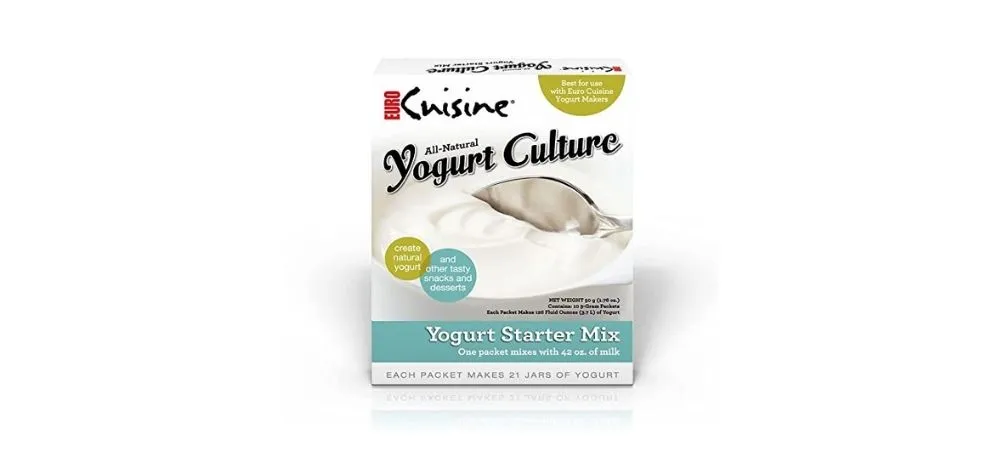While milk allergy is a common food allergy, often people are confused about ‘Is it Okay to have Yogurt if One is Allergic to Cow’s Milk?’ If you are allergic to milk, it does not necessarily mean that you will be allergic to yogurt as well. And, if this is the case, it can be a symptom of some other underlying condition.
| According to studies, 50% of the children able to tolerate yogurt who are allergic to cow’s milk |
An allergy to cow’s milk protein (Whey and Casein) is different from lactose intolerance, a sugar that can be found in milk. If you are allergic to casein or whey proteins, it would be best not to have yogurt under normal circumstances because of cross-reactivity. Some brands of yogurt are casein-free and might be okay, but this would have to be checked on an individual basis.
According to Quora Users, one should eat soy yogurt instead of dairy yogurt, if allergic to cow’s milk.
Are there other products that could be substituted for yogurt?
Other dairy products that could be substituted are cottage cheese, cream cheese, ricotta cheese, and sour cream. There are also some soy-based yogurts on the market today. You can choose a substitute depending on your preference. Say, soy-based and coconut-based yogurt are the best vegan options. Among all, sour cream is considered the best substitute as it matches the flavor and creamy texture of yogurt.
| Substitutes like cottage cheese, sour cream, and cream cheese may match the flavor but not the probiotic qualities of yogurt. They also differ in nutritional value. |
Lactose-free (and casein-free) cheeses are the best choices for people allergic to milk protein called casein.
Related Posts:
- Is Greek Yogurt bad for cholesterol?
- Is yogurt good for diarrhea?
- Does yogurt give me heartburn?
- Can eating Yogurt prevent diabetes?
- Which is healthiest dairy – Fat, Non Fat, No Fat?
- Is yogurt good for high blood pressure?
Milk Allergy Vs Lactose Intolerance
According to NCBI, Milk allergy and lactose intolerance are two different concepts. While milk allergy is due to problems in the immune system, lactose intolerance is primarily a digestive issue. However, in both cases, you should avoid dairy products. Food allergy is more severe than lactose intolerance as you may experience the side effects within minutes of consuming food that you are allergic to.
Milk allergy can be a possible result of your immune system overreacting to a specific food protein. It means that even if you eat small quantities of foods like yogurt that consist of a specific protein, you will have adverse consequences.
On the other hand, if you are lactose intolerant, then it is safe to eat a small amount of yogurt. It is because yogurt has a much lower amount of lactose as compared to milk.
Coming yogurt is not necessarily a dairy product. You can make vegan yogurt using soy milk, almond milk, cashew milk, and coconut milk.
Is it okay to have yogurt if one is allergic to cow’s milk?
People the milk allergies should avoid dairy yogurts. All the products containing milk such as ice-cream, cheese, and yogurt should be strictly avoided.
If you are allergic to casein, you must know that the dairy-based yogurts contain 80% of casein. Do you know, Cream and butter have only some traces of casein?
What are common symptoms of an allergy to cow’s milk?
Common symptoms of allergic reaction after 2.4 hours of consuming the cow’s milk:
- Abdominal Pain
- Hives
- Vomiting
- Itching
- Swelling
- diarrhea
Chronic milk allergy can lead to anaphylaxis, which is a life-threatening reaction.
Can one be both lactose intolerant and allergic to cow’s milk?

Yes! Unfortunately, the two are vastly similar in symptoms, so it is often hard to tell them apart if you do not take further steps than just drinking lactose-free milk (vegan milk). A milk allergy is not similar to lactose intolerance. If you are allergic to cow’s milk, it means you are allergic to the milk protein.
However, if you are not able to breakdown lactose, it means you are lactose intolerant. As the lactose in your abdominal ferments and your body is not able to break them down, you will experience, bloating, gas, diarrhea, and abdominal pain.
If you are just lactose tolerant, you may be able to digest the yogurt better than cream or milk. The reason is the less lactose present in yogurt as compared to other dairy products. Consider trying the Greek Yogurt as it has the lowest lactose level among all types of yogurt.
If someone can’t eat dairy, can they use lactose-free milk?
Yes. Lactose-free milk is free from casein protein, which means that those who are dairy and casein intolerant can also use it. It all depends on the person and how your body handles lactose and casein proteins, respectively. Some people handle one or neither of them well, so it would be best to consult a doctor or allergist for further information.
How long does it take for the allergic reaction to begin after ingestion?
The time it takes for reactions to begin depends on the severity of the allergy and how your body reacts to it. Generally, it takes 30 minutes to 2 hours after ingestion for visible symptoms.
Can an allergy to cow’s milk be outgrown?
Yes, allergies to cow’s milk are often outgrown. According to research, about 80% of children are able to outgrow their milk allergies by the age of 16.
What is the purpose of whey in food products?
Whey is used as a filler and has many purposes, including thickening, adding flavor, providing protein, and more. Whey is full of protein and exceptionally healthy. People who are looking to gain strength and muscle mass such as bodybuilders and athletes, whey is an important food that helps in growing muscles while losing weight.
Whey protein comes with additional vitamins and macronutrients that give a boost to your health.
What can one do if they are allergic to both dairy and soy?
If you are allergic to both dairy and soy, you should avoid such foods containing soy and milk to prevent the allergic symptoms. There is no treatment for food allergies as of now. Your body reacts with the protein present in the soy and dairy. You can experieince the symptoms within 2 minutes to two hours after ingestion.
However, processing and heating the product can change the protein structure of such products, making them less allergic. It may take up to two weeks for the proteins present in the milk and soy to be completely out of your system.
What to Avoid if allergic to cow’s milk?

Here are some of the foods which you should strictly avoid if you are allergic to cow’s milk:
– Ice cream, sherbet, and other products containing milk protein (casein)
– Cheese made from dairy milk
– Anything that indicates the presence of milk protein on the label (including whey which can be an ingredient in some snacks like chips) Be sure to check for “hidden” sources of milk protein-like:
– Malt (flavoring and coloring)
– Natural butter flavoring such as in popcorn or some snack foods
– Food starch, maltodextrin, soy sauce, etc. – many ingredients must be scrutinized for safety
Use your senses to understand the components of the product. The labels could be deceptive at times.
Is there Cow’s Milk in Yogurt?
Yes. Yogurt is made from milk, but it is fermented, so the lactose has been broken down to be digested better by most people. However, there are also yogurts on the market today that are dairy free.
What can you eat if you are allergic to cow’s milk?
There are many alternatives, but soy, rice, and almond milk products are the most common ones.
Can I Eat Cheese if I am Allergic to Milk?
It depends on the type of cheese. Some cheeses contain a very low percentage of lactose which might be okay for some people, but it would vary from person to person and depend on how much was eaten. If you are not sure, be safe and avoid it.










